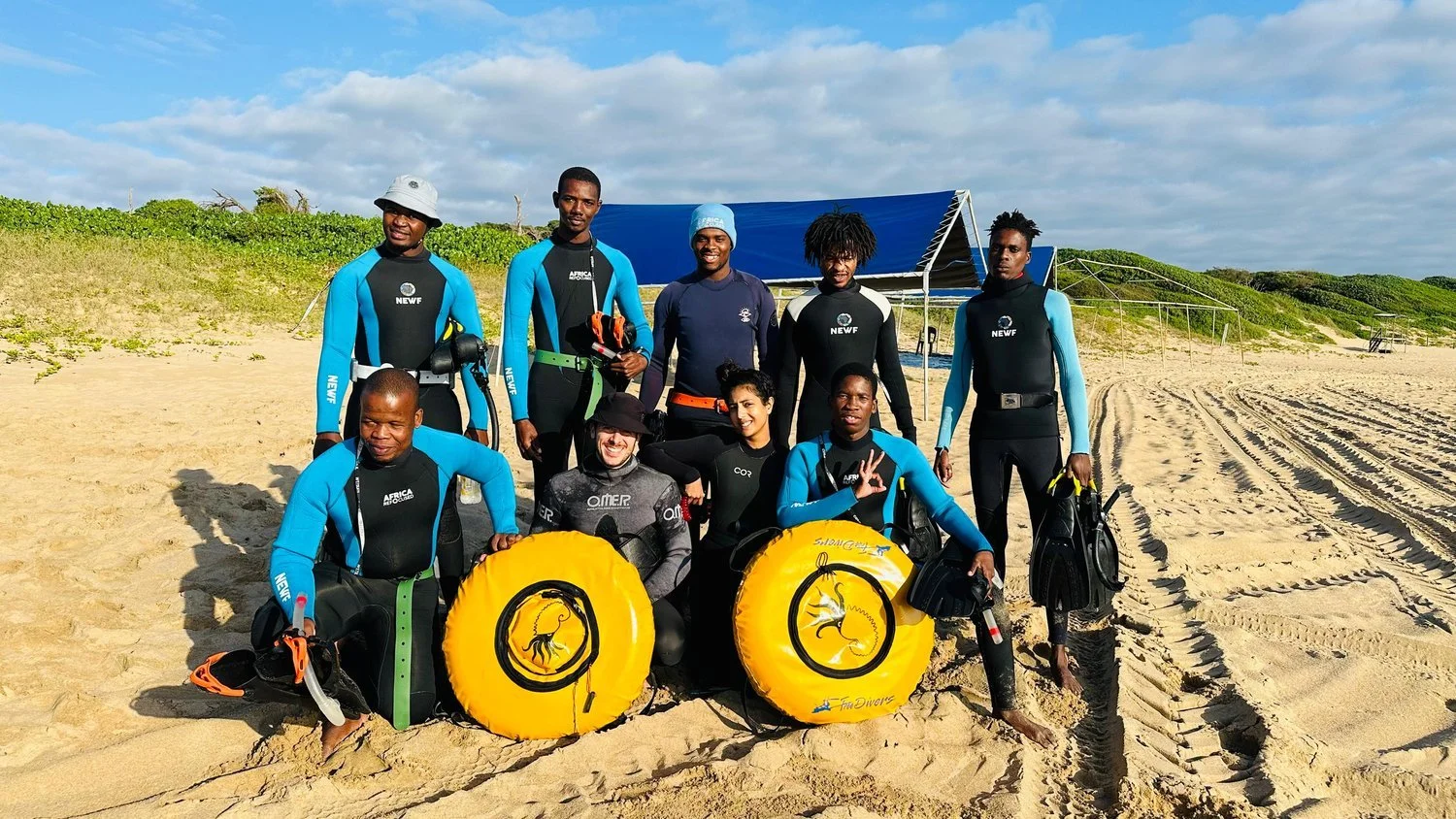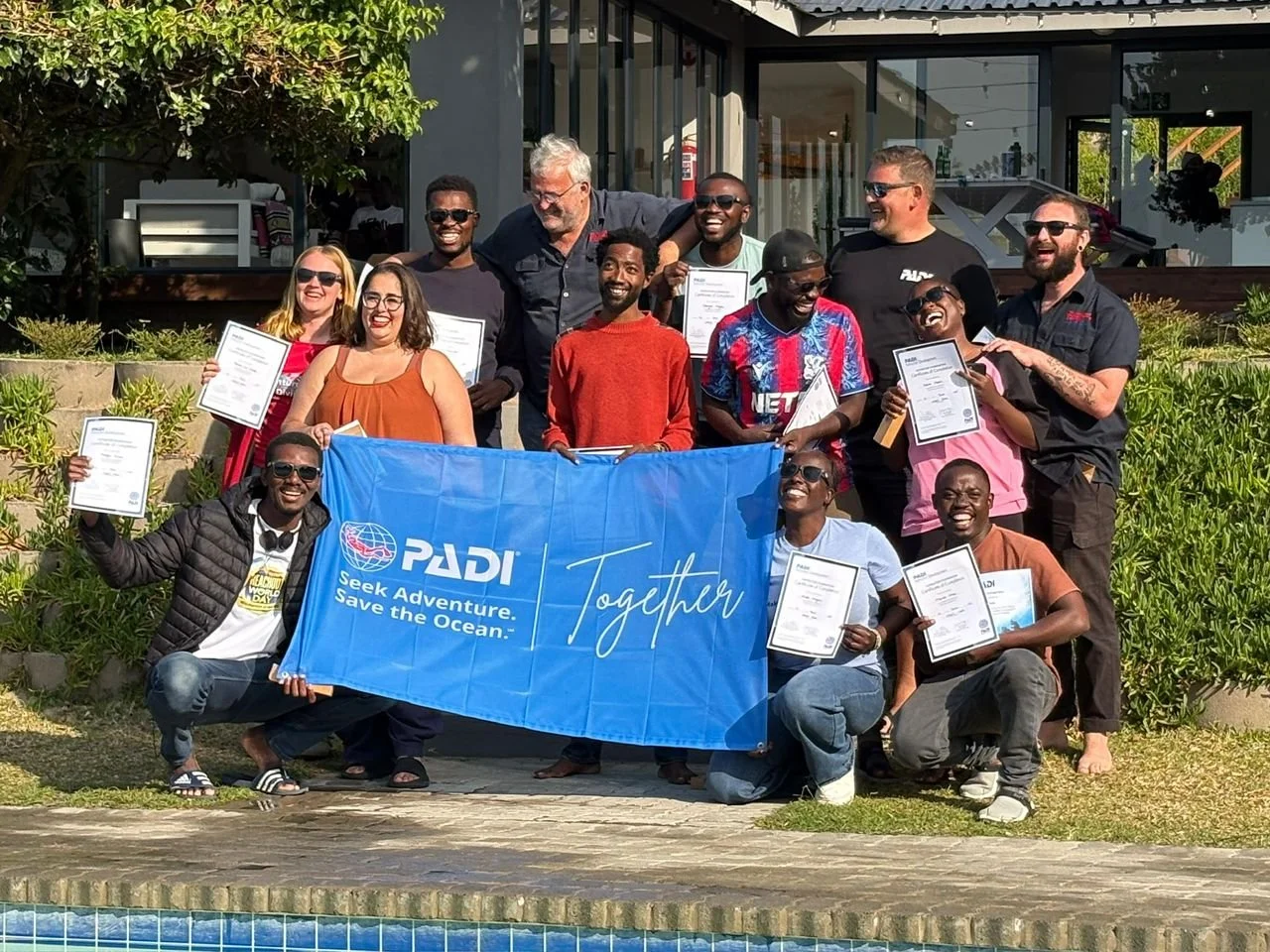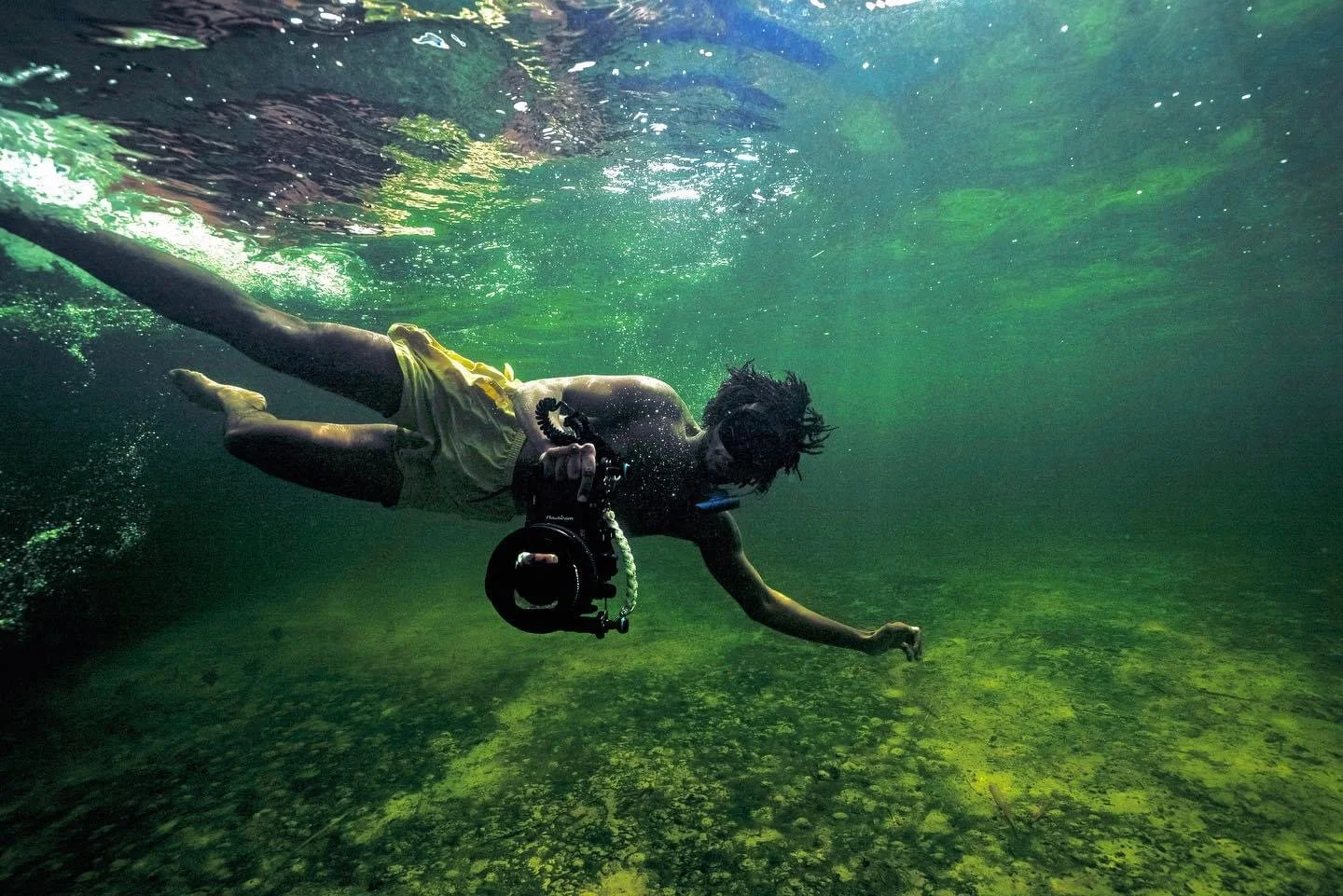Sustaining what sustains us: Supporting Inclusive Ocean Culture By and For the Sea
For a long time Africa’s relationship with the ocean has moved between fear, fable and fantastic dreams separating us from the ocean with painful, seemingly impenetrable walls.
So, how does an organisation inspired to break industry barriers for African storytellers find themselves facilitating Africa’s largest Ocean Access Program for African Scientists, Conservationists and Storytellers?
Photograph from the NEWF x DWP x YICAP Echange courtesy of Gunjan Menon and Saiyam Wakchaure.
The start of an era
Let’s take a step back to NEWF’s Annual Congress, the inaugural annual event that saw NEWF analysing a plethora of industry and continent-wide challenges. In 2017, scientists, conservationists, industry professionals and a range of filmmaking and storytelling talent came together to pitch and debate Africa’s place in these thriving and exclusive industries.
With so many incredibly passionate, knowledgeable and innovative African people separated from the ocean by the long and complex history separated from the ocean for many reasons that include deep-rooted colonial trauma and cultural tales often crafted to protect us. Academics and innovators are often bound to labs, desks and the surface of the ocean, and if they’re lucky, the surface layer of the ocean.
This frustrating reality contributed to the limited narratives about Africa’s oceans, the limitation of representation in the academic and storytelling world, and the communities and local conservationists bound to ocean culture in a variety of ways.
While the magnitude of this problem presented an overwhelming need for change, it also provided the kind of exciting, tangible and solution-orientated conundrum that fosters innovative impact initiatives - this time, sparking the first NEWF Dive Lab in 2019, an opportunity they hardly had a moment to dream would lead to the growing contribution to bridging access gaps for these fellows.
Both through access to formal training and certification, and through the stories and work they were and still are doing to change the narrative around what it means for us to be connected to the sea.
“In the first place, I never ever believed that I would be diving one day - it wasn’t even a thought. And then [with the dive labs] when it became a thought, I thought it was impossible. And then when it became a need, the reality is that I was terrified. I am not a good swimmer, I don’t have water culture - I am one of the people who went to the ocean only twice a year.”
Institutionalised barriers preventing access to niche dive, science exploration and storytelling industries meant rolling their sleeves up to pilot the first lab as an introduction to underwater filmmaking, bringing together filmmakers, story development and an African Scientist with his own fears to face, to produce NEWF’s first short featuring the underwater world, Phefumla.
Dr. Aristide Kamla, a megafauna specialist from Cameroon who went from fellow to partner between 2023 and 2024, offers the perfect case study on Africa’s double-edged sword: The barriers faced on most of the continent, accompanied by the opportunity and momentum that comes with finding ways to chip away at access barriers for scientists, coastal countries across Africa - and related industries lacking representation.
Instead of collecting and measuring water samples and doing what he should be doing with an unhindered momentum; part of his work as a scientist (with more access and support than many in his country) is to establish technical access in the region. In order to continue his research and scale the ecological impact potential it has, he is in the position of having to set up dive schools to support the work they are trying to do.
Pioneering a powerful wave of momentum
In the wake of this new way of exploring capacity enhancement, a long series of fateful moments and intentional thinking led them on a path that would see NEWF supporting a catalogue of ocean films through the uncertainty of the COVID19 Pandemic, pioneering the 2021 Decade Divemaster Storytelling Lab during a time when COVID was still rife, hosting their first Freediving Lab facilitated by Argonaut Science in Cape Town (later another in Sodwana Bay), supporting a large, multi-cohort dive lab series in Tanzania (led by Nancy Iraba and Jerry M’angena from Actions For Oceans, formerly known as Aqua-Farms Organization), building eKhaya Storytelling, Research and Dive Centre in Sodwana Bay where it all started - and where dive training programs are now permanently based and locally led - and hosting the first Youth Diving With a Purpose (YDWP) exchange in 2024.
Photograph from the NEWF x DWP Exchange, by Yarminiah Rosa.
Reflecting on the 2021 Decade Divemaster Storytelling Lab, NEWF’s third and biggest at the time, Noel recalls being confronted with challenges that pushed him to explore the ocean himself, offering a far deeper understanding of how to refine the dive labs and a deeper respect for the lived experiences of divers in training.
“The 2021 Decade Divemaster Storytelling Lab will continue to be one of the most influential events in my life, in NEWF’s life and so many people’s lives. Many of the lessons we learned there were painful but they were so important. We needed everything that happened in those 3 months to happen to be able to sit with it, reflect and think about what the future looks like. I remember all of you imploring me to learn to dive, and I thought, ‘I’m terrified, please don’t do this to me.’, but I couldn’t tell y’all that - but after my first dive I understood why y’all wanted me to. Finally the penny dropped and a better way forward started forming.”
This new understanding culminated in grasping the importance of something as simple as a wetsuit fitting you properly, to what it feels like to be the only person of colour on a boat full of divers. An experience that shook each of the ten (10) divemasters-in-training at some point when curious eyes would look to their tent, ask about their training or be visibly surprised at a boat full of women of colour - many of whom had quickly surpassed the level of training and skill of the average tourists who fuel Sodwana Bay’s thriving recreational dive industry.
“There is so much that we learned from that (DSSL) lab that made me realise that no matter what, I had to go on this journey. There have been times when I’ve been put on a second boat, separate from the fellows and the only person of colour on a boat. And you feel strange.”
This strangeness is a common experience amongst black divers-in-training, one punctuating the need for normalising diversity in these industries that are known to be white-dominant despite indigenous peoples' long - albeit broken - history being connected to the ocean for sustenance, spirituality and recreation.
What does access lead to?
Following a vibrant trail of intrigue witnessing fellows newly exploring relationships with the ocean - or deepening their journeys - Kiyah Kok, Noel’s youngest daughter, started training as an accompanied open water diver on the day of her 10th birthday. Later becoming curious about other activities, she prompted the question of what privilege looks like for her generation…
An observer to her experience sitting on those same boats, looking out to sea with excitement, we spoke for a bit about access versus privilege for kids like her - kids whose parents who are only just figuring out what it truly means to have the freedom of choice - choice that might break open a new world or be cast aside to try something different; a privilege indigenous Africans have seldom enjoyed.
For many of us (myself included) the most important work lies in normalising these experiences to achieve true equity, freedom of choice and the chance for a new generation of Africans to simply try new things without stereotypes and judgement at the very start of their journeys. That journey almost always starts with an instructor quite literally holding your hand and guiding you through an initially overwhelming amount of information, newness and a mix of excitement and fear that is differently balanced for every individual.
“Ocean access is not just a concept, it must be lived and felt. This kind of access depends on training environments that are also emotionally safe, culturally aware, and trauma-informed.”
Who your instructor is and how much you naturally understand each other as people defines the unfolding of your experience.
Having access to translation or native language tuition absolutely impacts your experience.
Being instructed by someone whose value system aligns with yours has immense power to shape your experience during training.
And if you are a Black or Indigenous diver lucky enough to have access to this - it’s a gift to go out into the world as a certified diver who is confident and has a dignified, positive story as the foundation of their ocean journey.
eKhaya Storytelling, Research and Dive Centre
NEWF’s dive programs planted the seed for a space like eKhaya and at the heart of its community-first value system and an early inspiration for the expansion of NEWF’s dive activities is Silindile Mbuyazi (affectionately known as Mama Sli), a local dive instructor, youth mentor, and 50% owner of the land eKhaya is built on.
Photograph from the Africa 2 Archipelago Exchange in 2024.
Local explorers, leaders and advocates from every discipline supported by NEWF as an organisation support the restoration of access and agency to their communities using their skills to identify challenges, ideate to find solutions and lead with through their own experiences and personal triumph. From Zulu-language storytelling dives to VR coral reef experiences for schoolchildren, eKhaya has emerged as a vibrant node of cultural restoration. People don’t just learn here. They remember.
Sli instructing during the Central Africa x NIOMR Dive Lab.
Now, as we speak, NEWF is proud to deepen this partnership with DWP by hosting the Youth International Cultural Awareness Program (YICAP), uniting 10 youth from the United States, 10 dive interns from Sodwana Bay who are currently participating in the YES Program, and a group of emerging and seasoned mentors and team members. The program includes Greg Hood from the US, returning for another unique exchange to mentor and experience a new cohort - alongside seasoned NEWF mentors and ocean explorers.
Over 10 days, these young people will have engaged in cultural dialogue, mock wreck dives, daily storytelling and vlogging, mentorship, and a series of dives and topside excursions. By embedding the program in local context and community, the collaboration ensures a meaningful exchange—one that honours lived experience, fosters empathy, and plants the seeds of long-term impact.
Photograph from the NEWF x DWP x YICAP Echange courtesy of Gunjan Menon and Saiyam Wakchaure.
“eKhaya is the physical manifestation of our values - an African-led hub of collaboration and the basecamp for all our programming. That said, ocean access and exploration continue to be a huge part of our organisational identity and mission work. Our ocean access programs support both the enhancement of skills for the passionate ocean advocates and multidisciplinary explorers in our community, and confidence and water safety skills enhancement for the local community.
Being certified as a PADI Educational Facility is a huge milestone for NEWF’s collective ocean journey; we are super-charged.”
Nine team members and fellows have become PADI-certified instructors, a feat that ensures more Africans will be teaching and training each other, on their own terms, and with a greater inclination to offer language support.
“As we reflect on World Oceans Month, it’s important to us to carry the heart of World Oceans Day with us everyday - to celebrate the communities, the stories, and the futures being shaped in and around eKhaya.”
The future of ocean storytelling
Showing the power of community and ocean access as an accelerator for new stories to be told, #NEWF2025 featured an ocean showcase of films and teasers produced by fellows, and featuring fellows and the local community - showing wildlife in ways that highlight the values held in this community. A precursor to the South x South Ocean showcase, each film brought into focus the tremendous growth with regards to production quality.
Still image from Precious Home.
Born from the creative synergy between Cape Verdean director Samira Vera-Cruz and Mozambican director and cinematographer Carlos Noronha; Precious Home is a poetic short documentary inspired by the courage and vision of Precious Osariemen, a young Nigerian marine scientist.
Échos des Récifs (Echoes of the Reef), a teaser for an upcoming also by Carlos Noronha and Samira Vera-Cruz, follows Gérard Zinzindohué an Oceanographer from Benin, passionate about using technology to understand and protect the ocean. His work bridges scientific research and advanced technology, developing tools that improve our ability to monitor marine environments with the aim to rediscover cold-water coral reefs in Benin and promote their conservation.
Still image from Échos des Récifs.
The Reef Keeper, teases at a dream coming true for George Amado from Ghana; a mathematician turned swim instructor - turned coral conservationist. For a long time, the plan was to make a film that shares the wealth on the coast with the community, creating a sense of national pride and awareness he hopes will inspire locals to assist in conserving Ghana’s marine biodiversity.
Through his film, he believes that re-storying his local reefs, subsistence fisherman and the local communities who live along the coast will be newly incentivised to combat the plastic pollution prevalent on many of the beaches as part of a holistic shift to creating new industries.
Still image from The Reef Keeper.
The catalogue paints new light, joyous triumph and exciting innovation - using motion pictures to tell a thousand words about the power and growing value of peer-to-peer and industry mentorship, gear access, and access to wild spaces in weaving powerful, high-quality narratives for diverse global audiences.
The result of more diverse crews; the quiet nuance, inclusivity and collaboration is articulated not in words but as a natural thread in the fabric of these deeply local and community-inclusive stories - sparking new inspiration and challenging observing fellows to craft the narratives only they can.
Photograph of Muhamago courtesy of Mogamat Shamier Magmoet.
Because you can’t save what you can’t SEA.
And thanks to eKhaya, we’re dreaming while doing the work to celebrate African-led custodianship and exploration, reimagining dive training culture, and continuing to grow our support for the restoration of Africa’s ocean culture together.
Important Disclaimer: While we acknowledge the importance of every single dive fellow, instructor and service provider who contributed to the success of NEWF’s dive programs, we are unable to include every milestone and name in a story of this kind. We hope our community and readers meet this with understanding.















